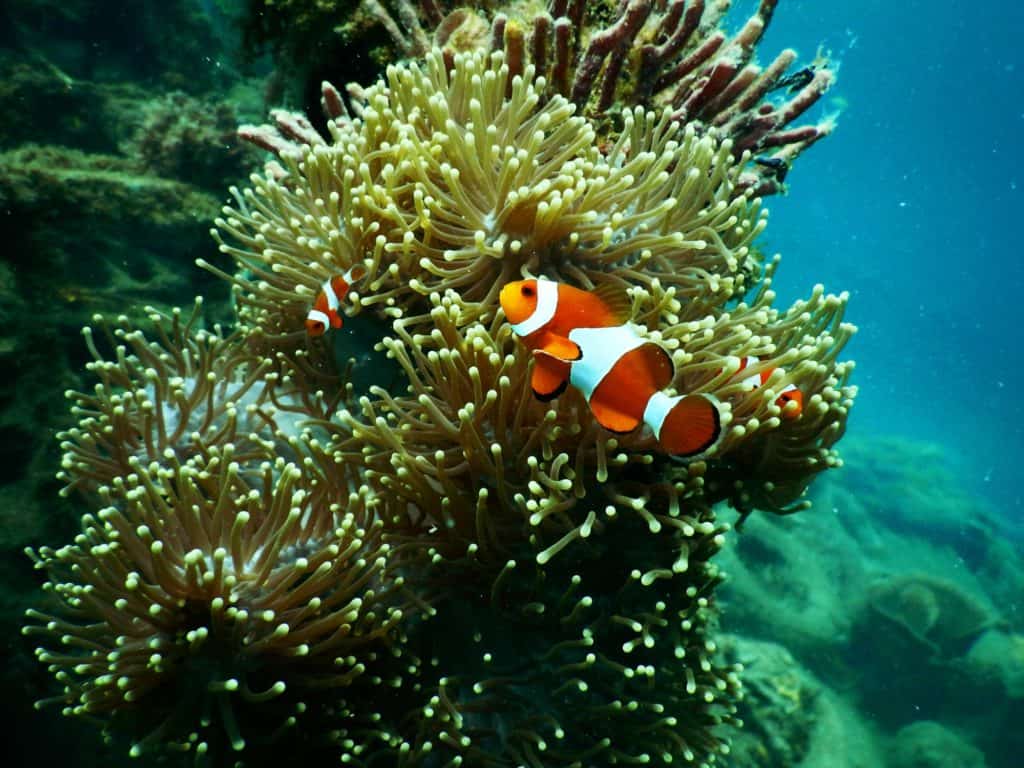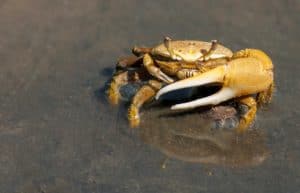Call free on: 0800 389 2839
Call free on: 0800 389 2839
Join in... The latest news and blogs from NEC
What is National Marine Week? Tuesday, 28 July 2020

National Marine Week runs from 25th July to 9th August and celebrates the over 30,000 species that call the seas around the UK home. Marine ‘week’ takes place over 15 days to allow for the different tidal patterns around the country, and whilst it is slightly different this year due to Covid-19, there are still plenty of ways to get involved.
How can you get involved in National Marine Week?

There are plenty of ways to get involved in National Marine week to celebrate the UK’s marine wildlife, and it is a great way of getting the family involved in the great outdoors, and teaching younger children about nature. One easy way to get involved is to go to the sea to watch the wildlife and report your findings here: https://www.wildlifetrusts.org/national-marine-week-species-reporting
Another way to get involved is with the events run over the 15 day period by WildlifeTrusts across the UK. These include beach art, rock pooling, sea watching, boat and kayaking trips and many more. More information can be found here: https://www.wildlifetrusts.org/get-involved/campaign/national-marine-week
For those who are not comfortable travelling to the seaside, there are resources on the Wildlife Trusts website that can help you learn more about our oceans and the creatures that live in them.
Why is National Marine Week important?
Focusing attention on UK marine life is important for a number of reasons. UK seas provide wonderful environments for marine life which makes up half of the UK’s wildlife. Protecting this life is essential for the environment as the world’s seas hold 80% of the planet’s biodiversity, the world’s largest ecosystem, and is an important source of food in the form of fish and seafood in various cultures around the world. Not only that, but ocean plants take in carbon dioxide and give off oxygen, just like the plants that grow on land, so healthy oceans help to protect our environment and atmosphere. Protecting our seas from threat is now more important than ever, not only to protect a beautiful and diverse habitat, but also as a vital resource for humankind. Some of the biggest threats facing UK seas include overfishing, plastic, climate change and chemicals such as pesticides which end up in coastal waters, killing marine plants and fish.
What can we do to reduce our impact?

There are many ways in which we can do our part to help the marine life in our seas thrive. The first step is education and awareness, through weeks such as this one, which help us to appreciate our wonderful natural environment and teach the next generation to respect and care for our seas. There are also lots of practical steps that can be taken to reduce the stress that we as individuals are placing on marine life. Wildlife trusts are calling for people to sign their open letter petitioning the government to create Highly Protected Marine Areas to protect areas of our waters from damaging activities in order to allow wildlife to be replenished – find out more here: https://action.wildlifetrusts.org/page/61642/data/1
Plastic is a big threat to our seas, with it being estimated that by 2050 there could be as much plastic in our seas as fish. This can have a very damaging effect on wildlife, such as choking sea birds or leading to microplastics being consumed by plankton and then passing back up the food chain, eventually ending up in the things that we consume. National Marine Week also coincides with Plastic Free July, a global movement where millions of people get involved to try to reduce their plastic waste. Find out more about Plastic Free July here: https://www.plasticfreejuly.org/get-involved/what-you-can-do/
Easy changes that have a big impact:
- Cut down or cut out single-use plastic – this includes items such as plastic bags, plastic straws and coffee cups. Replace them with canvas bags, paper straws and reusable coffee cups, all of which can be washed or recycled.
- Use your own containers for your shopping and buy more loose vegetables. This is a simple way of telling supermarkets that you as a consumer don’t need everything to be wrapped in plastic and eventually, they may make changes.
- Shop locally. Many independent businesses such as farmers’ markets, butchers and fishmongers, are more likely to package items in a sustainable manner and will be willing to put items in your own containers.
Want to go further?
There are a number of professions that a passion for marine life and the world’s oceans can lead to, such as marine research, marine biology or environmental engineering. If your interest extends beyond this week of awareness, we have many qualifications and courses that may be of interest:
IGCSE Biology

If you are interested in the natural world, from microscopic cells to vast ecosystems, IGCSE Biology will enable you to explore and understand life on Earth. As you study you’ll build up your knowledge of key biological concepts and put them into practice using 11 core practicals which are suitable for home study.
IGCSE Chemistry
Our stimulating IGCSE Chemistry online course brings learning to life through a series of practical experiments suitable for completion at home and will develop your knowledge of core concepts across physical, organic and inorganic chemistry. This broad and complex subject will help you to understand the world in which we live and opens up a range of science-based degree courses and careers.
IGCSE Combined Science
This course explores the basic principles and applications in biology, chemistry and physics and leads to a single award qualification, one IGCSE, based on your performance in all three subjects. You’ll learn key scientific concepts through a mix of theoretical and practical studies and experiments suitable for home completion, whilst also developing skills of enquiry, accuracy, initiative and inventiveness – qualities that are highly valued by universities and employers.
IGCSE Double Science
If you want a good grounding in the sciences, this course is for you. Equivalent to two GCSEs and covering three sciences, this course has 21 sections – seven each in biology, chemistry and physics. By studying three sciences in this way you will gain a broad perspective and a strong foundation, helping you make an informed choice about pursuing science in the future, such as at A level.
A level Biology
With A level Biology you’ll explore complex ideas using relevant, engaging topics and high-quality distance learning materials. Alongside subject knowledge, you’ll develop research, problem-solving, organisational and analytical skills – all highly sought by universities and employers. You’ll learn how to critically evaluate scientific information and evidence and gain a broader understanding of how biology shapes everyday life, and complete 18 core practicals, suitable for completion at home. You can also opt to gain a practical skills endorsement – a requirement for certain university and career choices.
A level Chemistry
Our A level Chemistry online course explores complex ideas from atomic structure, equilibrium, transition metals and modern analytical techniques. You’ll learn to critically evaluate scientific information and evidence, as well as building a broader appreciation of the critical role chemistry plays in our society. As part of studying A level Chemistry online, you’ll put theory into practice through 19 core practical experiments, some of which are suitable for completion at home. You can also opt to gain a practical skills endorsement – a requirement for certain university and career choices.
Structured Fast Track A level Biology
We usually recommend that you complete an A level course over a two year period but a structured Fast Track A level course is particularly useful if you’re studying with a specific purpose in mind, like applying to university, and need your grades quickly. This Biology course has been designed to follow a 36 week programme of study to equip you to take your exam in 2021.
Structured Fast Track A level Chemistry
With our structured Fast Track A level Chemistry course you’ll complete your A level in a year. If you are a highly motivated individual with the time to dedicate yourself to 36 weeks of programmed study, and would like to improve your chances of achieving your desired grade, our highly structured Fast Track A level Chemistry course could be the perfect option for you, and will help ensure you are ready to sit your exams in 2021.
Leave a Reply Cancel reply
More stories
working at NEC
Uncategorized
- Balancing an A level with My Passion for Dance
- The Future of Art History: Why Study A level History of Art with the National Extension College?
- Why Study Physics?
- Embracing a New Path: Jill’s Journey from Online Learning to Career Success in Art History
- How Toby Found a Perfect Fit for His Passion: Online A level English Literature with NEC
Study Tips
Student Stories
- Balancing an A level with My Passion for Dance
- Passion and Academics: How Izzy Balances Full-time Musical Theatre Studies with Studying A level Physics
- How NEC Helped Kari’s Son Niko to Continue his A level Studies Despite Long-Term Illness
- Embracing a New Path: Jill’s Journey from Online Learning to Career Success in Art History
- How Toby Found a Perfect Fit for His Passion: Online A level English Literature with NEC
SFT
Results Day
- Resitting A level STEM Subjects: How to Turn Your Setback into a Stepping Stone for a Brighter Future
- Resits vs. Retakes: Understanding the Difference and Making the Most of Your Second Chance
- GCSE Results Day 2024: What to Do When You Didn’t Get the GCSE Results You Wanted
- GCSE Results Day 2024: Your Complete Guide
- A level Results Day 2024: Your Ultimate Guide to Success
Policy and Campaigns
- A Pathway to Success Beyond A levels: Why Level 4 and Level 5 Qualifications Matter
- Schools and Academies Show 2024: Insights for School Leaders
- Big Data and Educational Trends: Insights for Students and Schools
- University of Cambridge Institute of Continuing Education offers tuition fee bursary for NEC A level students
- Five study bursaries for state sector teachers to take online A level Classical Civilisation offered by The Classical Association
Podcast
Our Courses
- Balancing an A level with My Passion for Dance
- How NEC’s Inclusive Approach to Learning Design is Redefining Independent Learning
- NEC’s Learning Design: A Pathway to Success for Independent Learners
- Passion and Academics: How Izzy Balances Full-time Musical Theatre Studies with Studying A level Physics
- Why Study Psychology? – Key Benefits, Careers and What You’ll Need to Study Psychology at University
Lifelong Learning
- A Pathway to Success Beyond A levels: Why Level 4 and Level 5 Qualifications Matter
- Benefits of Homeschooling: Is Home Education Right for Your Family?
- How NEC’s Inclusive Approach to Learning Design is Redefining Independent Learning
- The Future of Art History: Why Study A level History of Art with the National Extension College?
- National Coding Week 2024: The Vital Role of Coding in the Modern World
Home Schooling
- Benefits of Homeschooling: Is Home Education Right for Your Family?
- How NEC Helped Kari’s Son Niko to Continue his A level Studies Despite Long-Term Illness
- Exploring Science Practicals at Home: A Guide for Homeschoolers
- Homeschooling in 2024: How to Personalise Your Child’s Education
- What is Homeschooling?
Guest Blogs
- Passion and Academics: How Izzy Balances Full-time Musical Theatre Studies with Studying A level Physics
- My Experience as a Marketing Intern with the National Extension College
- The economics of political parties
- Embarking on a journey: My decision to ‘Fast-Track’ A level Physics with NEC
- Homeschooler Andrew’s experience of studying IGCSE Chemistry
General
- Balancing an A level with My Passion for Dance
- A Pathway to Success Beyond A levels: Why Level 4 and Level 5 Qualifications Matter
- Schools and Academies Show 2024: Insights for School Leaders
- How NEC’s Inclusive Approach to Learning Design is Redefining Independent Learning
- NEC’s Learning Design: A Pathway to Success for Independent Learners

Add a new comment
Current comments: 0